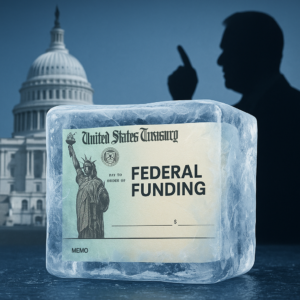March 28, 2025 | Posted By: Emma Doull
 In 2024 and early 2025, multiple federal court rulings struck down executive attempts to unilaterally freeze foreign aid, slash agency budgets, and expand presidential authority. These developments highlight a less-discussed but critical battleground: who controls the purse strings of public programs, and what happens when those strings are cut by politics instead of policy?
In 2024 and early 2025, multiple federal court rulings struck down executive attempts to unilaterally freeze foreign aid, slash agency budgets, and expand presidential authority. These developments highlight a less-discussed but critical battleground: who controls the purse strings of public programs, and what happens when those strings are cut by politics instead of policy?
At Hoyer Law Group, we understand how these executive power moves can disrupt nonprofits, contractors, whistleblowers, and even foreign governments—especially when lawful funding is suddenly withheld or rerouted. If your organization is a federal grant recipient or your work relates to government programs, understanding these shifts could be crucial to protecting your rights and mission.
Courts to the Rescue: Restoring Frozen Foreign Aid
One of the most prominent examples of judicial intervention came when a D.C. federal judge ordered the Trump administration to restore foreign aid that had been unlawfully frozen. Despite the judge’s directive, the administration repeatedly ignored court-imposed deadlines to unfreeze funds, prompting additional legal motions from advocacy groups.
This case underscores how executive decisions—sometimes made without Congressional approval—can dramatically upend funding streams for international development, humanitarian aid, and security partnerships.
“The administration cannot just ignore lawful judicial orders when it finds them politically inconvenient.”
— Federal Judge ruling in Open Society v. Trump Administration
Why This Matters to Federal Grantees and Contractors
Organizations that depend on federal funds—whether in healthcare, education, or international outreach—can find themselves in a bind when political agendas override established funding processes. These impacts include:
- Delayed or canceled funding for ongoing projects
- Uncertainty in contract compliance and performance metrics
- Workforce disruptions and layoffs due to stalled projects
- Legal exposure for breach of federal grant conditions
These risks are not hypothetical. In one court case, multiple nonprofit recipients of USAID funding faced the prospect of program closures and staff terminations due to the executive freeze, even though Congress had appropriated the funds.
What Should You Do If Your Organization Faces a Federal Funding Freeze or Enforcement Action?
Do not wait for formal enforcement action if your organization receives federal grants or contracts and is impacted by a sudden funding freeze, politically motivated enforcement change, or a potential violation notice. Instead, counsel with deep experience in federal program compliance and enforcement defense should be retained. A qualified legal team can help you understand the statutory authority for funding (or its suspension), evaluate any executive orders at play, and engage with the appropriate agency to resolve disputes. Your organization should also assess its internal controls, preserve relevant records, and avoid retaliation if whistleblowers are involved.
The Growing Trend: Presidential Control Over Independent Agencies
Another danger lies in the attempt to eliminate traditional limits on the president’s power to fire agency heads. President Trump’s executive orders, including one seeking large-scale budget cuts in coordination with Elon Musk, proposed redefining how agencies operate—targeting so-called “deep state” resistance and potentially eliminating institutional checks designed to protect whistleblowers, inspectors general, and independent prosecutors.
These power grabs echo a broader trend where presidents seek greater command over agencies meant to act independently—from ethics watchdogs to anti-corruption units. For instance, the Foreign Corrupt Practices Act (FCPA) saw de-prioritized enforcement directives under executive policies, threatening to undermine U.S. credibility in fighting global bribery. Learn more about the FCPA on the U.S. Department of Justice’s FCPA page.
Legal Resistance Against Unchecked Executive Action
Thankfully for some, the judiciary has stepped in to rebalance the scales:
- Judges barred hypothetical spending freezes that hadn’t gone through the legal process.
- Orders were issued to restore foreign aid and enforce compliance.
- Courts refused to allow unilateral budget planning by executive fiat.
These rulings demonstrate a key point: the rule of law still works when challenged. But the legal process can be slow—and in the meantime, nonprofits and contractors face real-world harm.
Final Thoughts: Funding Fights Aren’t Just Politics—They’re Legal Battles
When federal aid is frozen, it doesn’t just create headlines—it disrupts lives, programs, and missions. While it may take the courts to restore order, legal preparation, and experienced counsel can help organizations weather the storm. Don’t wait for Congress to act if your funding is at risk or your mission is interrupted by political action. Contact us for a confidential case evaluation.

